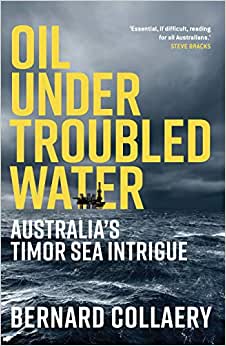‘“A petroleum-intoxicated kleptocracy”: Bernard Collaery on Australia and Timor-Leste’, Honest History, 4 August 2020
Alison Broinowski reviews Bernard Collaery’s, Oil under Troubled Water: Australia’s Timor Sea Intrigue
©Alison Broinowski 2020
 In response to the ‘war on terror’, multiple laws have been rushed through parliaments, particularly in Australia. The public is told the laws are to protect national security. But they are also used to protect governments from embarrassing revelations and to conceal operations that are in governments’ interests, but not necessarily those of the public. If governments were proud of their activities, they wouldn’t keep them a secret.
In response to the ‘war on terror’, multiple laws have been rushed through parliaments, particularly in Australia. The public is told the laws are to protect national security. But they are also used to protect governments from embarrassing revelations and to conceal operations that are in governments’ interests, but not necessarily those of the public. If governments were proud of their activities, they wouldn’t keep them a secret.
In one such notorious operation 16 years ago, an ASIS team, posing as aid workers for the Howard government, bugged the Cabinet room and other offices of the Timor-Leste government, during ‘good faith’ negotiations about ownership of undersea oil and helium reserves. The advantageous agreement Australia secured was tainted by the bugging. An ASIS officer became concerned when Foreign Minister, Alexander Downer, and DFAT Secretary, Ashton Calvert, accepted paid positions with Woodside Petroleum which, along with Royal Dutch Shell and ConocoPhillips, benefited from the negotiations. Federal Police raided the home of the officer, known as ‘Witness K’, and seized his passport.
Legal proceedings in the ACT against K are being conducted in secret, as are most of the hearings in the ACT Supreme Court involving Bernard Collaery, the lawyer whom, with official permission, K consulted. A former ACT Attorney-General, Collaery is accused of using information provided by K to help Timor-Leste in its court challenge against the deal on the Timor Sea boundary. The warrant for seizure of legally privileged documents from Collaery’s chambers in 2013 was issued by the Attorney-General under anti-terrorism laws. Collaery’s home and office were bugged and his electronic archives ‘plundered’.
The Morrison Government passed a law requiring a judge, when deciding for or against an open trial, to give the greatest weight to the Federal Attorney-General’s view on secrecy, which is what has happened in these cases. Secrecy similarly shrouds the cases of ‘Witness J’ and former Army lawyer, David McBride, also in the ACT. As Ian Cunliffe, former CEO of the Australian Law Reform Commission, recently wrote in the Sydney Morning Herald (17 July 2020), secret trials undermine the rule of law, the openness of the judicial system, and the principle that cases are decided by independent judges, not by the executive government or Parliament. On the Timor-Leste matter, Cunliffe remarked, the government has neither confirmed nor denied the bugging: ‘But if there was no bugging, it would not breach official secrets laws to say there was’. And if it was lawful, what offence would K have committed by informing Collaery of it?
Australian support for Timor-Leste goes back to World War II, when servicemen promised that the help they received from the East Timorese against Japan would not be forgotten. It was, of course, by some. But even while later governments in Canberra favoured Indonesia, some Australians kept the Timor-Leste cause alive. They included Jim Dunn, Rob Wesley-Smith, and Richard Ackland. Collaery mentions Shirley Shackleton, Susan Connelly, Josephine Mitchell, and other Catholic nuns, and two war veteran intelligence officers whose names he cannot divulge. Collaery’s concern for Timor-Leste is shared by other Australian lawyers, politicians, and journalists. His law practice is closed down, and his solicitors at Gilbert+Tobin are acting pro bono. In Canberra there’s a Coalition of Supporters of Bernard Collaery and Witness K (COSOCK), and a supporters website with a petition signed by more than 50 000 people.
Collaery calls his book ‘a long duel … between rule of law and opportunistic greed’, an uneven contest between Australia and Timor-Leste, with politicians, diplomats, corporations, scientists, and intelligence services all involved. He detects a ‘peculiarly Australian opportunism’ at work, for which he particularly blames DFAT, and says Downer was drawn into error over Timor-Leste by the lure of oil.

Timor-Leste national flag
As the morality of Australian political leadership decayed, ‘a petroleum-intoxicated kleptocracy’ induced parliament to licence the stealing of resources. With some individual exceptions, Collaery writes, both sides of Australian politics have abandoned the ‘rules-based order’ which Australia helped to establish in 1945 and which our Ministers keep recommending to other countries. Even in 1940, he shows, Australia was involved with Britain and Portugal in the exploitation of the sovereign assets of a poor neighbour whose independence we took credit for supporting six decades later.
Further ‘hearings’ (heard only by those allowed entry to the court) of Collaery’s and K’s cases are expected in coming months.
* Alison Broinowski AM Alison Broinowski is a former Australian diplomat. She was vice president of the Honest History association and is vice president of Australians for War Powers Reform. She has written many articles for Honest History (use our Search engine), most recently a review of Peter Edwards’ biography of Justice Robert Hope.


Leave a Reply
You must be logged in to post a comment.